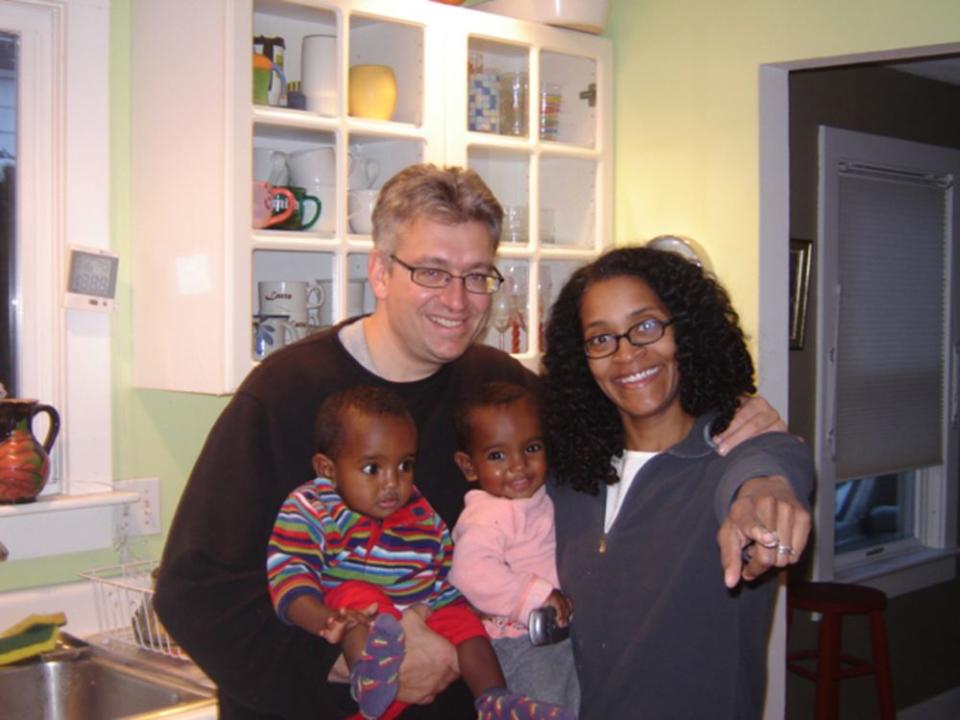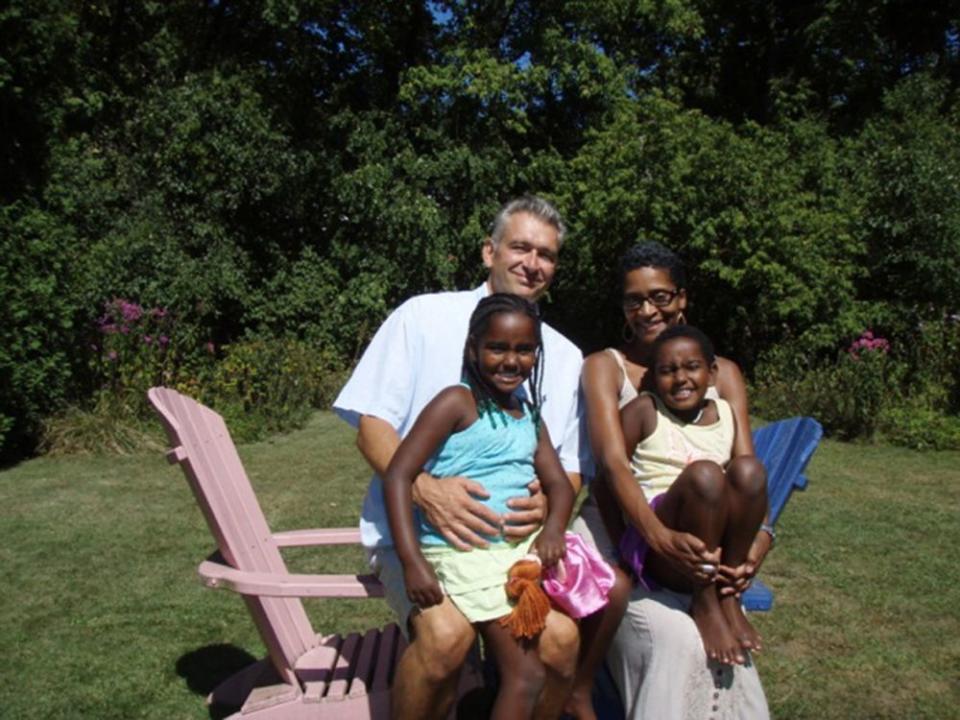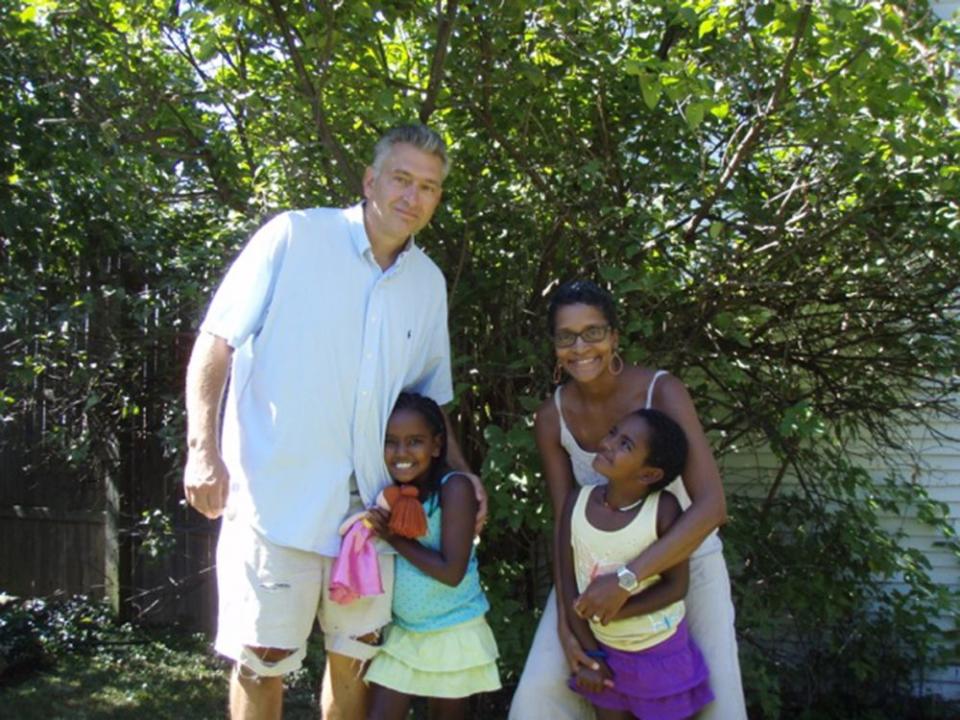Author Emily Bernard On Surviving a Mass Stabbing, Race and Her Interracial Marriage
At a time when Americans appear to be isolating themselves in their identity groups, author Emily Bernard’s new book shows us that we’re not so different after all. A black woman from the South, she married a white man from the North — and the couple adopted two children from Ethiopia.
Her memoir of essays, Black Is the Body: Stories from My Grandmother's Time, My Mother's Time, and Mine, explores the love, pain and humor of her life that is universal to the human experience.
In a powerful opener, Bernard recalls the night she was stabbed by a white man.
It was August 1994, and Bernard, then a Yale graduate student, was at a popular coffee shop in New Haven, Connecticut, when a stranger stabbed her and six other customers for no obvious reason. Daniel Silva, who set his house on fire before the stabbing, was originally declared incompetent to stand trial. He was given a suspended 10-year sentence in 2009, according to the New Haven Register.
“People always ask me why I’m not angry at him and, trust me, I’ve searched inside thinking, ‘Is something wrong me with me?’ I should be furious,” Bernard, 51, tells PEOPLE in an exclusive interview. “But when I looked at him, there was nobody there. I looked in his eyes and for me… his part of the story begins and ends that night with his own illness, his own sickness.”

Now a professor of English at the University of Vermont, Bernard still occasionally experiences severe pains from her wounds.
“The stabbing created these adhesions where my intestines get mixed up with my scar tissues. It’s incredibly painful,” she says. “In my case, [the adhesions] happened over and over again. It means I end up [on] yet another gurney in a hospital.”
Though the stabbing was unrelated to the fact that she was black, Bernard writes that it made her reflect on race.
“I was not stabbed because I was black,” she writes in Black Is the Body, “but I have always viewed the violence I survived as a metaphor for the violent encounter that has generally characterized American race relations… There was no connection between us… yet we were suddenly and irreparably bound by a knife, an attachment that cost us both: him, his freedom; me, my wholeness.”

The incident compelled Bernard to contemplate compassion rather than anger — and she explores the idea in essays about blackness, motherhood, home and her multi-racial family. She was also motivated to write because of her “frustration and sadness” over the anger that defines today’s news cycle.
“I don’t want to drown in this,” Bernard says. “I don’t want to drown in negativity and blaming and victimhood or perpetrator-hood.”
She adds, “I believe in books. Reading has saved me and as James Baldwin says, ‘We think our pain is unique in the history of the world, and then we read.'”
Bernard gets particularly vulnerable when she explores her marriage in Black Is the Body. She’s married to John Gennari, 58, an Italian-American. The author explains that when she and Gennari first started dating, she was “afraid to be out in the world with him” because of how they would be received. The author even paused in writing Black Is the Body because she was nervous readers “would decide that I was the wrong kind of black person.”
“The misconception, of course, is that our marriage is different because we look different,” she explains, “because we don’t look like a traditional couple.”

In reality, they’re “very ordinary,” she says.
In her essay “Interstates,” Bernard describes the powerful moment when she was traveling with Gennari (then her fiancé) and her parents to Mississippi. She describes her father’s unease at making certain stops while traveling South as a black man. At one point, Gennari stops with them all in the car to change a tire — and later, to get gas at an unfamiliar gas station.
“John was not ignorant of the root of my father’s anxiety. But the danger presented by the flat tire took precedence over any other type of danger,” Bernard writes. “Somewhere between the clarity of his focus and the complexity of my father’s anxiety, perhaps, lies the difference between living white and living black in America.”
While Bernard “despise[s]” that this difference exists, it doesn’t stop her from loving Gennari.
Later when Bernard learns her mother has died, Gennari joins her on her journey back home.
“We held hands and drove in silence, both of us staring at the road ahead,” Bernard writes. “This is marriage, I thought, or at least my marriage. It is not the stories of forbidden desire that thrilled me as a girl, or even magical rides through clouds and on dark waters. It is John’s right hand in mine, and his left one sure and steady on the wheel.”

Bernard also discusses adoption of children from different races and different cultures. Thirteen years ago, she and Gennari adopted twin girls, Giulia and Isabella, from Ethiopia when they were babies.
She explains that some people who have adopted children have relied “a little too heavily on the language of poverty.”
“[They’ll say,] ‘Oh, it’s so sad.'” Bernard says, explaining that she’s upset when adoptive parents “allow that language to impact the way they approach their own children.”
“I wrote [the essay] ‘Mother on Earth’ because it was a rejection of that,” she says. “I thought, ‘I’m going to write an essay about adoption that is not saturated in guilt and worry and anxiety.'”
She continues, “This is our duty in some ways as human beings. To take care of each other is very fundamental.”
Andy Cohen Says Being a New Dad to Son Benjamin Is a ‘Dream’ but Jokes ‘Sleep Is Another Story’
Bernard is raising her daughters to embrace their American identity and their Ethiopian roots — at the same time she’s exploring her own.
“When we talk about race, there’s such an assumption about what race should be like and what we as people of different races should be like,” Bernard says. “[There’s assumptions that] we should conform to a standard way of thinking and being and we should care about the same things.
“But that’s never been true for me as a black woman,” she continues. “Toni Morrison says that she writes the book that she wants to read and I think it’s true in this case. I wanted to show myself in order to find myself.”
Black Is the Body is on sale now.

